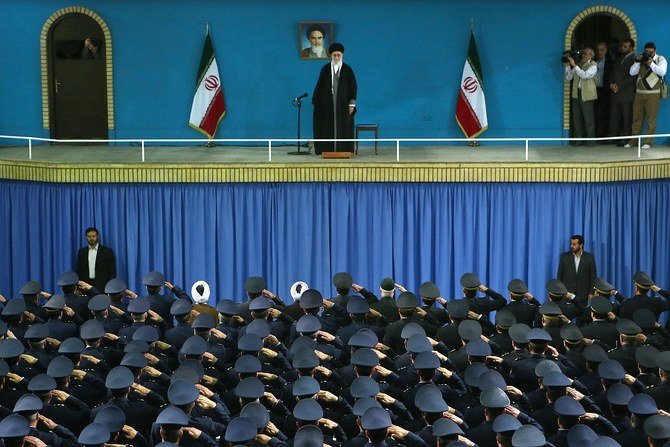Unrealistic to expect Iranian regime to change its behavior
Dr. Majid Rafizadeh/Arab News/July 30/ 2020
د. مجيد زافيزادا: من غير المنطقي التوقع أن يغيير النظام الإيراني من تصرفاته
The argument that the Iranian regime can be talked into changing its foreign policy, whether through diplomacy, negotiations or financial incentives, defies logic and reason. Even so, there are leaders around the world who advocate for pursuing appeasement policies with the ruling clerics of Iran as a way of altering their destabilizing behavior in the region.
For example, the final draft of the US Democratic Party’s 2020 platform, which was released this week, lays out the party’s Iran policy. In order to change the regime’s behavior, the Democrats’ platform calls for diplomacy and negotiations with Tehran and a return to the Joint Comprehensive Plan of Action (JCPOA), aka the Iran nuclear deal, suggesting Joe Biden would lift US sanctions against the Iranian government should he win the November election.
Offering economic and political incentives is a legitimate policy to convince a modern and rational state to abandon or alter its malign activities. But what the advocates of this policy fail to understand is that the Islamic Republic is not a conventional state that can be persuaded to change its foreign policy. It is a revolutionary state, founded in 1979 on specific ideals that constitute the core pillars of its existence.
What are some of these revolutionary ideals that the regime has not changed in four decades? The Islamic Republic believes it is religiously superior in the region and beyond. This sense of religious superiority comes with another ideal of leading the whole Muslim world based on the terms it dictates. The constitution of the Islamic Republic makes it clear that the government’s religious mission is not limited to the boundaries of Iran. It states: “The Constitution provides the necessary basis for ensuring the continuation of the Revolution at home and abroad. In particular, in the development of international relations, the Constitution will strive with other Islamic and popular movements to prepare the way for the formation of a single world community.”
Another revolutionary principle of the regime is to employ hard power in order to export its religious ideology to other nations. The constitution delegates to its military the fulfillment of this goal: “The Army of the Islamic Republic of Iran must be an Islamic Army, i.e., committed to Islamic ideology and the people… It will be responsible not only for guarding and preserving the frontiers of the country, but also for fulfilling the ideological mission of jihad in God’s way; that is, extending the sovereignty of God’s law throughout the world.”
The Islamic Republic is not a conventional state that can be persuaded to change its foreign policy
Another firm revolutionary principle is anti-Americanism. As Ali Shirazi, Supreme Leader Ali Khamenei’s representative in the Quds Force, said in 2015: “We will stand fast against the world of arrogance. We will not rest until we have raised the banner of Islam over the White House.”
If we carefully study the four-decade rule of the Islamic Republic, we can clearly see that the Iranian regime has maintained these core pillars of its ideology throughout its ups and downs and times of war and peace since the 1979 revolution.
After the JCPOA nuclear deal was struck in 2015 and Iran was unshackled from UN Security Council sanctions, the regime did not moderate its behavior or put its revolutionary ideals aside. In fact, the regime became more empowered and emboldened to exert its influence in the region.
Once Iran was liberated from the restrictions of international sanctions, it began launching ballistic missiles in violation of UN resolutions and increased its support for Syrian President Bashar Assad by recruiting militias, providing financial and military assistance and sending more troops to Syria. The Islamic Republic also became a defiant member of OPEC, as it blatantly rejected a 2016 proposal by fellow members, including Qatar, Saudi Arabia and Venezuela, to reduce oil output in order to address a global surplus.
After the nuclear deal came into effect, a series of assassination and terrorist plots across Europe — some successful, others not — were traced back to Tehran. Human rights violations and domestic repression also escalated. The Islamic Revolutionary Guard Corps expanded its militaristic role in the region, while Iran’s destructive actions and funding and arming of known terror and militia groups also increased. These include Hezbollah and the Houthis. Not only did chants such as “Death to America” not disappear after all those appeasement policies and diplomatic initiatives, Tehran also became more aggressive in the Gulf and repeatedly harassed naval ships without fear of any repercussions.
The Iranian regime has maintained the core pillars of its revolutionary ideals since 1979. Expecting that it will change its destructive policies as a result of diplomacy and appeasement is totally irrational and unrealistic.
Dr. Majid Rafizadeh is a Harvard-educated Iranian-American political scientist. Twitter: @Dr_Rafizadeh


















